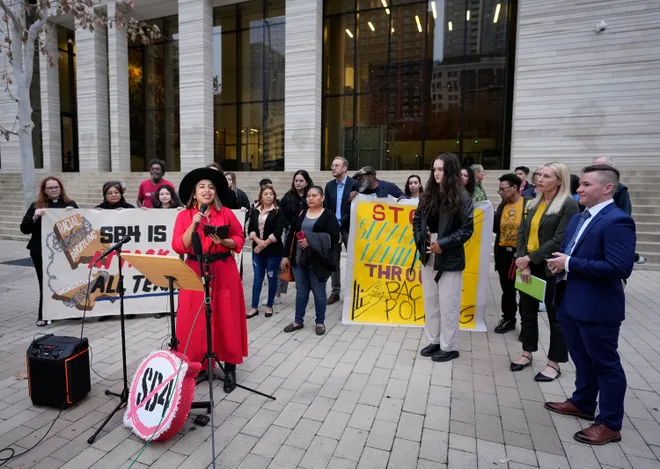Federal judge blocks Texas' immigration enforcement law SB 4: Here's what's next
Texas cannot enforce a new set of immigration laws the state Legislature passed last year after a federal judge's ruling Thursday.
Judge David Ezra of the U.S. District Court for the Western District of Texas decided to enjoin Senate Bill 4 from going into effect next week. He agreed with constitutional concerns raised by federal prosecutors at a hearing earlier this month that immigration enforcement is well beyond the purview of state governments.
"Several factors warrant an injunction," Ezra wrote in his ruling to enjoin SB 4. "First, the Supremacy Clause and Supreme Court precedent affirm that states may not exercise immigration enforcement power except as authorized by the federal government."
Ezra similarly indicated further concerns over conflicting provisions between SB 4 and federal immigration law, which would be "to the detriment of the United States’ foreign relations and treaty obligations."
Texas' lawyers filed an immediate appeal to the U.S. Court of Appeals for the Fifth Circuit shortly after Ezra's ruling.
What is Texas Senate Bill 4?
SB 4 increased penalties for anyone suspected of crossing the U.S-Mexico border in Texas outside of a legal international port of entry.
The legislation allows state law enforcement officers to arrest, detain and deport individuals suspected of crossing the border illegally. It also mirrors the federal law that makes illegal entry at the U.S. border a misdemeanor and illegal re-entry a felony.

The bill would require people accused of illegally crossing the state's southern border to either accept a magistrate judge's deportation order or face a second-degree felony charge for noncompliance. The Legislature passed the bill in November during a special session and it was set to go into effect on March 5.
Judge rejects claims immigration surges are an invasion
Striking against the heart of Texas' argument laid out Feb. 15, Ezra found that an influx of migrants and immigration surges do not invoke the meaning of an "invasion", and Texas would not be engaging in its limited war powers by enforcing SB 4.
Additional issues with the law could frustrate the asylum processes and allow for the incarceration of noncitizens before their possible removal, making it substantially harder for those noncitizens to apply for asylum after entering the country, Ezra wrote.
Federal prosecutors filed their lawsuit against the state in January and joined previous suits filed late last year challenging SB 4 by the ACLU, ACLU of Texas, Las Americas Immigrant Advocacy Center, American Gateways, the Texas Civil Rights Project and the County of El Paso.
“El Paso County applauds the court’s clear confirmation today that immigration policies rest solely under Federal jurisdiction, and the state of Texas’ interference with the U.S. Constitution will not be tolerated," said El Paso County Commissioner Iliana Holguin in a statement after the ruling. "A piecemeal approach from individual states on federal matters such as immigration enforcement would put an undue burden on local taxpayers, while opening the door to potential civil rights violations for border residents and immigrants alike.”
Greg Abbott says Texas will appeal ruling
Gov. Greg Abbott vowed to continue fighting to enact SB 4, adding that an immediate appeal is necessary in response to the Biden Administration's border policies. He emphasized the need for Republicans to keep pushing the border conversation ahead of the March 5 primary election.
"Texas will immediately appeal this decision, and we will not back down in our fight to protect our state—and our nation—from President Biden's border crisis," Abbott said in a statement. "Texas has the right to defend itself because of President Biden's ongoing failure to fulfill his duty to protect our state from the invasion at our southern border."
Abbott mentioned Ezra's acknowledgment that the case will "ultimately be decided by the U.S. Supreme Court."
Bipartisan vote:House passes short-term deal to avert devastating partial government shutdown
Joe Biden, Donald Trump both visit Texas-Mexico border
President Joe Biden and former president Donald Trump are both visiting the Texas-Mexico border Thursday.
For the second time during his presidency, Biden is visiting the state to address border security and criticize Republicans derailing a border bill this month. During his trip in Brownsville, Biden was expected to speak with federal immigration agents, law enforcement officials and local government regarding his push for Congress to quickly pass border security legislation.
Meanwhile 325 miles northwest, the GOP frontrunner was scheduled to visit Eagle Pass, where a standoff between the federal government and the states has occurred over border security. Abbott joined Trump to provide an update on the state's unprecedented response to "President Biden’s border crisis," he said on X (formerly Twitter).
The dueling visits come as a Pew Research Center poll released this week shows that 80% of Americans believe immigration has become the most crucial issue in the nation, for the first time since the last decade.
Contributing: Lauren Villagran

Disclaimer: The copyright of this article belongs to the original author. Reposting this article is solely for the purpose of information dissemination and does not constitute any investment advice. If there is any infringement, please contact us immediately. We will make corrections or deletions as necessary. Thank you.



